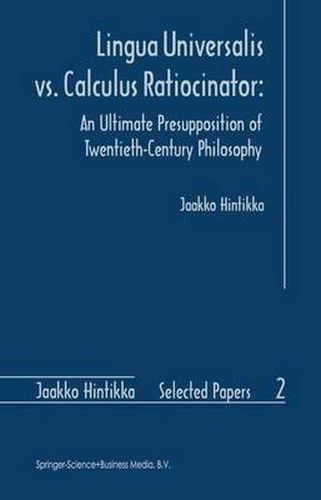Readings Newsletter
Become a Readings Member to make your shopping experience even easier.
Sign in or sign up for free!
You’re not far away from qualifying for FREE standard shipping within Australia
You’ve qualified for FREE standard shipping within Australia
The cart is loading…






This title is printed to order. This book may have been self-published. If so, we cannot guarantee the quality of the content. In the main most books will have gone through the editing process however some may not. We therefore suggest that you be aware of this before ordering this book. If in doubt check either the author or publisher’s details as we are unable to accept any returns unless they are faulty. Please contact us if you have any questions.
The essays collected here explore a fundamental contrast between two overall visions of language and its availability to self-examination. They can be characterized as language as the universal medium and language as calculus (or the model-theoretical view). The former normally includes the ineffability of semantics and a one-world ontology. This contrast has dominated twentieth-century philosophy but has scarcely been acknowledged before. Philosophers examined here from the vantage point of the contrast include Peirce, Frege, Wittgenstein, Carnap, Quine, Husserl and Heidegger. Tarski’s famous result concerning the indefinability of truth seems to decide the issue in favor of the universalists. Hintikka nevertheless shows that Tarski’s result is inconclusive and that truth can in fact be defined in languages which are in certain respects comparable to ordinary language. This unique volume is a must for every contemporary philosopher and for everyone interested in the semantics of our language.
$9.00 standard shipping within Australia
FREE standard shipping within Australia for orders over $100.00
Express & International shipping calculated at checkout
This title is printed to order. This book may have been self-published. If so, we cannot guarantee the quality of the content. In the main most books will have gone through the editing process however some may not. We therefore suggest that you be aware of this before ordering this book. If in doubt check either the author or publisher’s details as we are unable to accept any returns unless they are faulty. Please contact us if you have any questions.
The essays collected here explore a fundamental contrast between two overall visions of language and its availability to self-examination. They can be characterized as language as the universal medium and language as calculus (or the model-theoretical view). The former normally includes the ineffability of semantics and a one-world ontology. This contrast has dominated twentieth-century philosophy but has scarcely been acknowledged before. Philosophers examined here from the vantage point of the contrast include Peirce, Frege, Wittgenstein, Carnap, Quine, Husserl and Heidegger. Tarski’s famous result concerning the indefinability of truth seems to decide the issue in favor of the universalists. Hintikka nevertheless shows that Tarski’s result is inconclusive and that truth can in fact be defined in languages which are in certain respects comparable to ordinary language. This unique volume is a must for every contemporary philosopher and for everyone interested in the semantics of our language.